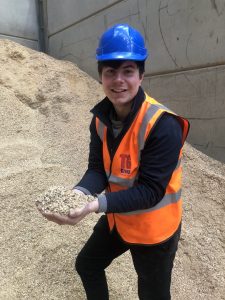Staff at a Shropshire company have unveiled a new environmentally-friendly animal bedding range that has been researched, created and tested through the midst of the Covid-19 crisis.
TG Renewable Energy is part of Tudor Griffiths Group’s TG Enviro Division, and the team has been working hard through the difficult last few months to launch these new products that are suitable for horses, cattle and chickens.
TG Enviro’s James Bright said: “Renewable and sustainable energy is a key objective for the TG Group, and we are very proud of our 3,000 sq m on-site Biomass plant and drying warehouse that houses seven megawatt boilers.
“The facility already plays a key role in the renewable energy section of our TG Enviro Division, which also includes skip hire and waste management recycling.
“And now, we are able to produce our latest innovation – animal bedding that is made out of virgin wood peelings which has already been approved by BSI. This peel is a by-product from a local timber producer, so we are actually using a surplus material which boosts the recycling element still further. In addition, we also produce cattle bedding sand using the sand from our Wood Lane quarry”
James said the company was producing over 100 tonnes per week of these new products and interest had been growing despite the restrictions of the pandemic.
“We are committed to producing the highest quality premium chip for the Biomass boiler market, some of which is sourced from our local woodland in Shropshire, with the balance coming from sustainable sources.
“And now, thanks to our experienced and creative team, we can expand our range still further to deliver products that will help our agricultural customers make their livestock more comfortable without causing damage to the local environment.”
As well as the Biomass plant, TG Group has enough capacity to offer a drying service on-site for timber, dry grains, pulses and contract woodchip drying.
The boilers are fuelled by shredded Grade A timber, which is from sourced segregated recycling, and they heat the seven perforated floors to dry the products that are then supplied to the residential and commercial markets.







